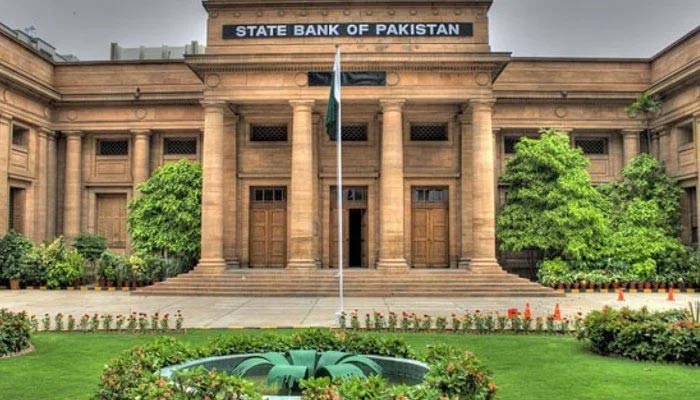SBP raises policy rate by 100 bps to all-time high of 21%
Central bank decides to revise policy rate in order to control stubborn inflation
In line with the market expectations, the State Bank of Pakistan (SBP) announced on Tuesday that it had increased the interest rate by 100 basis points (bps) to 21%.
The Monetary Policy Committee (MPC) — which was constituted as a statutory committee under the State Bank of Pakistan Act — decided to increase the policy rate to its highest level in an attempt to "anchor inflation expectations around its medium-term target — barring any unanticipated shock.".
"The MPC views today’s decision as an important step towards anchoring inflation expectations around the medium-term target, which is critical for achieving the objective of price stability," noted the central bank.
The country recorded historic high inflation at 35.4% in March on an annualised basis while core inflation, which was calculated after excluding the volatile energy and food prices, increased in March to 18.6% in urban areas and 23.1% in rural areas.
The SBP has raised rates by a total of 1,150bps, since January 2022.
The committee stated that since the last meeting — on March 2 — it has noted three important developments having implications for the macroeconomic outlook, which include:
- Current account deficit has narrowed considerably, more than previously anticipated
- Significant progress has been made towards completion of the 9th review under the IMF’s EFF programme
- Recent strains in the global banking system have led to further tightening of global liquidity and financial conditions
- “In this context, the MPC considers the current monetary policy stance appropriate, and stresses that today’s decision, along with previous accumulated monetary tightening, will help achieve the medium-term inflation target over the next eight quarters,” the Monetary Policy Statement (MPS) — issued after the committee’s meeting — read.
However, the Committee noted that uncertainties attached to the global financial conditions as well as the domestic political situation pose risks to this assessment.
The MPC noted that the surge in inflation was broad-based, though a large part of it was contributed by food and energy components this reflects the pass-through of increases in taxes and duties, unwinding of untargeted energy subsidies and the recent exchange rate depreciation.
“To anchor these expectations, the MPC views its current monetary policy stance as appropriate to keep the real interest rate in positive territory on a forward-looking basis,” the MPS read.
The MPC noted that the surge in inflation was broad-based, though a large part of it was contributed by food and energy components this reflects the pass-through of increases in taxes and duties, unwinding of untargeted energy subsidies and the recent exchange rate depreciation.
“To anchor these expectations, the MPC views its current monetary policy stance as appropriate to keep the real interest rate in positive territory on a forward-looking basis,” the MPS read.
‘Conclusion of IMF programme critical’
In February 2023, the current account saw a deficit of only $74 million and the cumulative deficit now stands at $3.9 billion in the eight months of the ongoing fiscal year (July-February), about 68% lower than the same period last year.
“This mainly reflects the contraction in imports, which continues to outweigh the combined decline in remittances and exports,” it stated.
However, despite the lower current account deficit, higher loan repayments relative to disbursements are keeping the foreign exchange reserves under pressure.
“Thus, the committee reemphasised that the early conclusion of the 9th review under the IMF programme is critical to rebuilding the foreign exchange reserve buffers,” it added.
It should be noted that the foreign exchange reserves held by the central bank stand at a critical level of $4.2 billion — barely enough to cover one month’s imports.
Fiscal consolidation ‘important’
The central bank’s committee noted that the fiscal outcomes during the period of July-January of the fiscal year 2022-23 have been encouraging in the context of achieving macroeconomic stability.
The fiscal deficit was contained to 2.3% of GDP during July-January FY23 compared to 2.8% in the same period last year, while the primary balance posted a surplus of 1.1% of GDP against a deficit of 0.3% last year.
It should be noted that this improvement in the primary balance was achieved on the back of lower subsidies, grants and development spending. Growth in tax revenues, however, has remained below target, amidst a slowdown in economic activity, reduction in imports and inadequate policy focus on expanding the tax net, while debt servicing has increased.
“In this context, the committee noted that delivering the envisaged fiscal consolidation is important to complement the ongoing monetary tightening in order to achieve price stability,” the statement read.
-
Bitcoin plummets toward $60,000 as investors dump risky bets
-
Bitcoin crashes below $63K as regulatory pressure and market fears grow
-
Bitwise Crypto Industry innovators ETF: What investors should do in 2026?
-
Nintendo shares slide again as momentum fears grow
-
Gold, silver prices fallen sharply; What’s driving the drop?
-
Gold’s record climb: Experts question if its safety is ‘overstated’
-
Dubai unveils plans to construct street built with real gold
-
Netflix slams Paramount’s bid: 'Doesn't pass sniff test’ as Warner battle escalates












